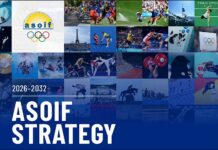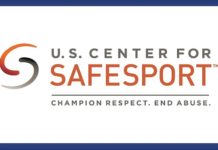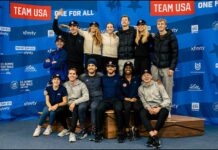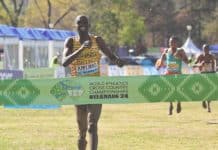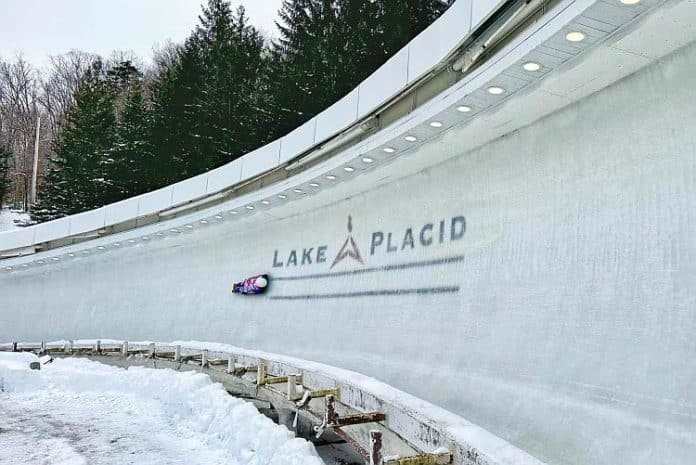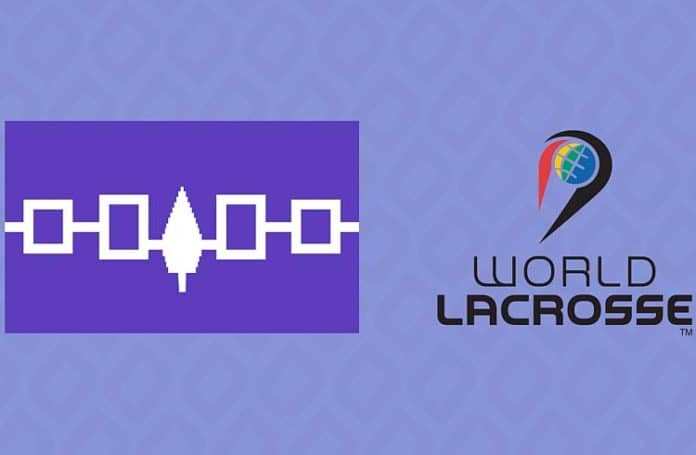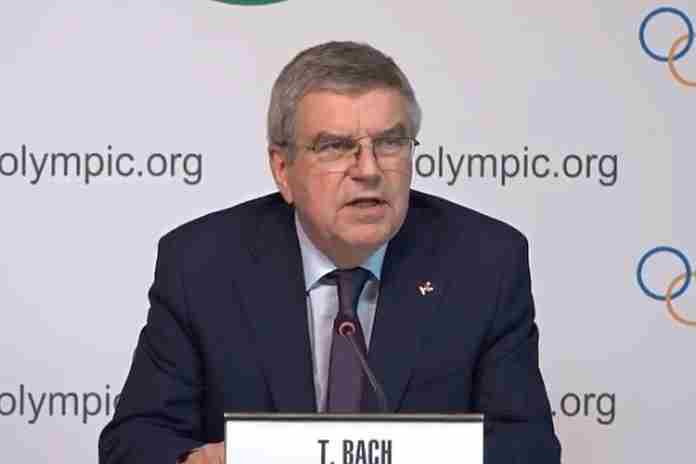★ The Sports Examiner: Chronicling the key competitive, economic and political forces shaping elite sport and the Olympic Movement.★
★ To get The Sports Examiner by e-mail: sign up here! ★
≡ THE 5-RING CIRCUS ≡
1. Oudea-Castera firm on surfing and the Seine for 2024
2. DeFrantz concerned over extent of French security procedures
3. Ukraine sports minister says Russians in Paris “very difficult”
4. Lake Placid asks for Milan-Cortina 2026 sliding sports! What?
5. International Federations increasing spending on anti-doping
● French sports minister Amelie Oudea-Castera said that the Paris 2024 surfing events will be held in Tahiti and that there is no “plan B” for the opening ceremony on the Seine River.
● Anita DeFrantz, the long-serving U.S. member of the International Olympic Committee, posted a note of concern over the security and transportation regulations now envision for Paris 2024. In a prior interview, Oudea-Castera called the Games-time rules “a necessary system.”
● While Russian response to the Olympic Summit’s formulation on Russian and Belarusian participation of “neutral” athletes has been muted, the interim Sports Minister of Ukraine continued to press for no Russian or Belarusian athletes in Paris, so as to “not allow Russia to use sport for military propaganda purposes.”
● The fight over the venue for bobsled, luge and skeleton at the Milan Cortina 2026 Olympic Winter Games continues, significantly tied to national politics, with a decision due in January. Beyond the expected alternatives offered in Austria, Germany and Switzerland, a bid to host the sliding sports also came from Lake Placid in the U.S. Yes, for real!
● A new study of anti-doping expenditures by the summer International Federations showed that spending between 2015 and 2022 increased from $27.7 million to $51.4 million, and that 27 of the 33 IFs surveyed were working with the International Testing Agency for some or all of their anti-doping programs.
● Panorama: LA28 (Haudenosaunee Nationals lacrosse fields men’s and women’s teams) = Athletics (2: separate area for “content creators” will debut at Glasgow 2024 indoor champs; provisional suspension for doping against Uganda’s Chesang) = Figure Skating (Malinin lands first quad Axel in a Short Program at Grand Prix Final) = Football (2: USSF announces National Training Center site; venues for 2024 Copa America, to be held in the U.S., announced) ●
1.
Oudea-Castera firm on surfing and the Seine for 2024
Surfing is not moving from Tahiti and the opening ceremony in Paris is not moving from the Seine River.
That’s from France’s Sports Minister Amelie Oudea-Castera, who said Thursday about surfing:
“[T]here’s no Plan B. We’re on this path which is really the right one. We’re on the right path to have a new, resized judges’ tower.”
She emphasized that the new tower plan, essentially replacing the existing wooden tower – which is considered unsafe – with an aluminum version that she said had responded to the requests made by the local community. She was critical of the Saturday test with a barge that caused some damage to the corals:
“There was a test that was obviously not well prepared and could not be conducted properly. And unfortunately it damaged bits of coral, which is obviously completely regrettable.
“The next test must be meticulously prepared.”
Reuters reported a Paris 2024 organizing committee statement that also expressed optimism on the site:
“The French Polynesian Government and Paris 2024 are working on solutions that will enable the new tower to be set up which has been reduced in size and weight.
“This was the result of collective effort between Paris 2024 and French Polynesian government to reduce the impact of the tower on the natural environment. Technical meetings organised with all those involved in the project, and guided by the project manager on site, should enable solutions to be found rapidly.
“With less than a year to go before the surfing events are due to be held in Teahupo’o, those involved in the project are reaffirming more than ever their desire to work with the associations in a transparent manner to ensure that the Paris 2024 Games are a success for French Polynesia.”
Oudea-Castera told France Inter radio on Monday that the Paris 2024 opening will be on the Seine River, “There is no plan B, we have a plan A within which we have several alternatives.” This includes the finalized number of spectators, especially for the upper viewing area, which will be announced next year; the initial expectation of 600,000 could be scaled back to 400,000 due to transport consideration as well as for security. She further explained:
“We have a certain number of adjustment variables [for the ceremony itself]. This is the case for the artistic, which will only be finalized in the spring with the capacity to modulate, to reduce certain parts of this programming.
“The gauge will be stopped in the spring, we can modulate it; we also have a variable adjustment around the number of festivities points around the area and in Paris. … And we also have, in terms of the management of security perimeters, the possibility of modulating things.
“There are security measures that will be greatly enhanced during the Olympic and Paralympic Games. … We undoubtedly, during the opening ceremony, a very particular security challenge, we have known that since day one.”
Asked directly if there was discussion of a different site, she replied that “this is not the hypothesis on which we are working.”
The minister noted that “The terrorist threat, particularly the radical Islamist threat, it exists, it is there, it is not new. It is neither specific to France nor specific to the Games. And it is followed very closely, both by all the forces of the Ministry of the Interior and by the entourage of the President of the Republic. We are lucid about this threat and we are putting everything in order to reduce it as much as possible.”
2.
DeFrantz concerned over extent of French security procedures
The highly-respected Anita DeFrantz, a U.S. member of the International Olympic Committee since 1986, twice an IOC Vice President and the Vice Chair of the Coordination Commission for the 2032 Olympic Games, wrote Thursday about her concerns over the newly-announced transit restrictions planned for Paris in 2024:
“As an advocate for the Olympic movement and a believer in the power of sport to unite and inspire, I find the recent security measures outlined for the Paris 2024 Olympics concerning. While understanding the necessity of ensuring safety, the proposed restrictions raise important questions about balancing security with civic freedoms.
“The requirement for residents near Olympic venues to obtain a QR code to pass police barriers and the registration of visitors to watch from private spaces seem to overly restrict the daily lives of Parisians. The Olympics are a time of joy and global unity, but such stringent measures risk overshadowing the celebratory spirit of the Games.
“Furthermore, the closure of metro stations and limitations on motorised traffic, while necessary for security, must be implemented thoughtfully to ensure they do not unduly burden the residents and visitors who are there to experience the magic of the Olympics.
“As we approach the Paris 2024 Olympics, it is crucial that security measures are balanced with the need to maintain the open and inclusive atmosphere that defines the Olympic spirit. The Games should be a time for celebration, not constraint, and should bring people together, not keep them apart.
“Let’s hope for a resolution that upholds both the safety and the freedoms of everyone involved in this grand event.”
Oudea-Castera, in her Monday radio interview, also spoke to this issue and had a different view:
“Paris will not be in a state of emergency. The system on security and traffic perimeters is a necessary system, which is based on a legal basis and which is proportionate. It has nothing to do with the state of emergency where we stay at home, with constraints criminal, and throughout the country: it is zoned, it only involves a QR code for motorized travel in red zones. We must be careful!”
She also expressed confidence in the transport system, contrary to the gloomy predictions of Paris Mayor Anne Hidalgo:
“I have always said that we are stronger with a committed and hard-working city of Paris. We must not play against our side; if some do it we must be stronger than that. Today, the subject is to work as a team, so that everyone can bring all their experience to the equation.
“We will be ready. We have very important work to do to finalize the infrastructure, complete the last elements of the transport plans. But for the rest, there is no alert.”
3.
Ukraine sports minister says Russians in Paris “very difficult”
Tuesday’s Olympic Summit decision, with the International Federation representatives “asking” the International Olympic Committee to “declare eligible for participation in the Olympic Games Paris 2024 those [Russian and Belarusian neutral athletes] who have qualified or will qualify on the field of play” was hard to accept for Ukraine. Interim Sports Minister Marviy Bidnyi explained to Agence France Presse:
“As President Volodymyr Zelensky rightly said: ‘Obviously, any neutral flag of Russian athletes is stained with blood.’ We are counting on a responsible decision and leadership from the IOC which will not allow Russia to use sport for military propaganda purposes.
“We respect the principle of neutrality, but neutrality is only possible in times of peace. When there is a war and one nation … destroys another, then ‘neutrality’ becomes irresponsibility.”
In Bidnyi’s view, “The refusal of the Russian passport is today the only possible way for an athlete to prove that Olympic excellence is his first priority, and that the athlete bears no part of the responsibility for the murders of Ukrainians.
“Morally, it is very difficult to enter the arena with those who want to kill you. And not figuratively, but actually kill you.
“Our athletes are constantly faced with provocations from the Russians and therefore cannot be in a normal emotional state. I can’t imagine how I would feel if I had to compete with Russians. It’s very difficult.”
He also noted that some 397 Ukrainian athletes and coaches have been killed in the Russian invasion so far, as well as the destruction of more than 500 sports facilities.
¶
The response from Russia on the Olympic Summit declaration has been muted, without any headlines from the Ministry of Sports or the Russian Olympic Committee.
At a sports medicine conference on Thursday, the director of the Department of High Achievement Sports of the Ministry of Sports of the Russian Federation, Alexey Drozdov, said:
“We continue systematic preparations for the Olympic Games, because we do not yet have a clear understanding and response from the International Olympic Committee. We are not curtailing our programs, everything is being implemented in full.”
4.
Lake Placid asks for Milan-Cortina 2026 sliding sports! What?
How about this shocker from a long story from the Rome-based Il Fatto Quotidiario about the Italian political infighting over the bobsled, luge and skeleton site for the 2026 Olympic Winter Games in Milan and Cortina (computer translation from the original Italian):
“The Milan-Cortina Organizing Committee confirmed ‘that it has long since started, following the direction expressed by its board of directors, a phase of analysis and in-depth analysis of the characteristics of the sliding centers present on the international scene. To date, the National Olympic Committees (NOC) of the United States, Germany, Austria and Switzerland have sent the necessary documentation for the analysis.’ There are therefore four foreign alternatives, but at least all three European ones (Koenigssee, Saint Moritz and Igls-Innsbruck) require IOC exemptions. Saint Moritz is in fact built every year with natural ice, the other two are in need of renovation.”
What?
The request comes from Lake Placid for the Mt. Van Hoevenberg track, which will welcome the opening of the FIL (luge) World Cup this weekend. The site has hosted the bobsled and/or skeleton Worlds in 1949-61-69-78-83-97-2003-09-12 and will again in 2025; it held the luge Worlds in 1983 and 2009 and hosted the Winter World University Games this past January (which did not have any of the sliding sports).
U.S. Olympic & Paralympic Committee chief executive Sarah Hirshland explained the bid in a Thursday session with reporters:
“Just this week, the New York State [Olympic] Regional Development Authority submitted a proposal to host the sliding events for the Milan-Cortina Olympic and Paralympic Games in 2026.
“The organizers of Milan-Cortina are actively seeking solutions to support the sliding sports competitions at the 2026 Games, and I’m proud to say that the New York Olympic Authority has stepped up and that we’re fully supportive of their efforts to welcome the world in 2026 for this important element of the competition. …
“The USOPC stands firmly behind this bid effort and believes that their proposal presents a compelling solution to host an extraordinary Olympic and Paralympic experience. We look forward to the opportunity to collaborate and support the effort to bring these prestigious events to the United States and are eager to understand the outcome of the decision by Milan-Cortina.”
Hirshland explained that the request for proposal from the Milan-Cortina organizing committee – sent to multiple National Olympic Committees which have such facilities in their countries – was received at the beginning of November and the deadline for submissions was 1 December.
The Milan-Cortina organizers expect to make a decision in January, with the local, regional and national political tug-of-war continuing, but the logical solution is in Europe. There is enormous doubt that a track could actually be built in the remaining time available in Cortina – and no company bid on the project when offered earlier this year – and the Cesana Pariol track for Turin 2006 was abandoned in 2012 due to operating losses of more than €1 million per year. Both will have major price tags attached to them, far more than using the facilities in Austria or Switzerland; the story notes, “Unofficially it seems that the foreign solution is now the most accredited.”
But in Lake Placid? Truth is always stranger than fiction.
5.
International Federations increasing spending on anti-doping
A significant survey report from the Association of Summer Olympic International Federations (ASOIF) showed that total spending against doping increased from $27.7 million in 2015 to $51.4 million in 2022.
Most of these budgets were spent on testing and analysis:
● 54.1% ($27.8 million) on testing
● 18.0% ($9.3 million) on analysis
● 6.9% ($3.5 million) on results management and legal follow-up
● 4.7% ($2.4 million) on intelligence and investigations
● 3.3% ($1.7 million) on education
● 2.0% ($1.0 million) on Therapeutic Use Exemptions (TUEs)
A total of $5.7 million (11.1%) was spent on administration.
In the future, most of the federations said that spending would increase on education and investigations.
A major change in federation anti-doping efforts has come with out-sourcing of some or all of their anti-doping programs to the International Testing Agency (ITA), founded in 2018. While 48% of the summer federations now use the ITA (as of 2022), the percentage of expected to rise to 64% within the next four years.
As of 2022, just two of 33 IFs did their own doping sample collections themselves, while 27 used the ITA, one used its own “integrity unit” and three used other anti-doping agencies. However, 14 did their own educational programs, while 16 used the ITA.
For the future, federations plan to implement more educational programs – 97% mentioned this in the survey – as a key to fighting doping in their sport. Testing remained a priority for 85% of federations.
In terms of impact, federations cited more intelligence-based testing (88%) and reducing costs through the use of new technologies (82%) as the key advances against doping.
≡ PANORAMA ≡
● Olympic Games 2028: Los Angeles ● Further to Thursday’s post concerning the concept of the cross-national Haudenosaunee Nationals lacrosse team as an entrant at the 2028 Los Angeles Games, Christy Cahill, the Chief Brand & Communications Officer for World Lacrosse notes that the Haudenosaunee field both men’s and women’s teams.
The men have been extraordinarily successful at the World Lacrosse Championships, with bronze medals in 2014-18-23, with the women’s team competing at the 2009-13-17-22 Worlds, finishing 11th-7th-12th-8th.
● Athletics ● Interesting development in media operations from World Athletics, which announced that a separate accreditation will be created for “content creators” and a separate interview area at the World Athletics Indoor Championships in Glasgow (GBR) next March. Said new World Athletics communications chief, Jamie Fox (GBR):
“Social media content creators are generating original and exciting content that attracts millions of views across the world, bringing a new generation of fans to athletics. So, we wanted to provide these innovators and entertainers with a space where they can embrace their creativity and develop content outside the confines of traditional media mixed zones. As we go forward, we will continue to develop and evolve this concept, delivering a best-in-class media operation for all involved.”
There have been clashes with traditional media and content creators in mixed zones at several events and a demand to separate the two, whose relationships with athletes, coaches and officials are often quite different. A separate area for content creators – adjacent to the media mixed zone – was arranged at this year’s USA Track & Field nationals in Eugene, arranged by the Tracktown USA organizers and which appeared to work reasonably well.
¶
Prisca Chesang, 20, of Uganda, the 2021 and 2022 World Junior 5,000 m bronze medalist, with bests of 4:08.15 (1,500 m) and 15:05.39 (5.000 m) was provisionally suspended for the use of Furosemide, a strong diuretic.
● Figure Skating ● American teen star Ilia Malinin took the lead in the men’s skating at the ISU Grand Prix Final in Beijing (CHN), landing his patented quadruple Axel jump to lead the Short Program.
Malinin, 19, is the only one to land this jump in competition and hit it right away in his Short Program skate, adding a quad Lutz and scoring a lifetime best 106.90 to lead Japan’s two-time World Champion Shoma Uno (106.02) and teammate Yuma Kagiyama (103.72).
It’s the first time that the quad Axel has been done in a Short Program; Malinin said afterwards, “Overall I feel really great and I’m glad that I was able to do the quad Axel for the first time in the short program. … “I think that after Grand Prix of France it was an idea of mine for a long time [to include it]. I’m just very glad that I was able to do it under pressure.”
The Free Skate will be held on Saturday.
In Pairs, Germany’s Minerva Fabienne Hase and Nikita Volodin took the lead in the Short Program at 72.56, ahead of Deanna Stellato-Dudek and Maxime Deschamps (CAN: 71.22) and Sara Conti and Niccolo Macii (ITA: 70.30).
The competitions continue tomorrow with the women’s Short Program and the Ice Dance Rhythm Dance.
● Football ● U.S. Soccer announced that its new National Training Center will be located on about 200 acres in Trilith in Fayette County, Georgia, 25 miles south of Atlanta, with the federation explaining that the site was selected by
“meeting key criteria that included accessibility and proximity to Atlanta’s major international airport as well as downtown, optimal climate for year-round programming, the ability to drive economic impact locally, and the opportunity to be part of a diverse, growing community.”
The statement specifically credited the assistance of sponsor Coca-Cola, which “played an important role in U.S. Soccer’s decision to bring the National Training Center to the company’s corporate hometown.”
The facility will support all of USSF’s 27 national teams and nine “extended” national teams. The plan calls for 12 fields, more than 100,000 sq. ft. for indoor courts and 200,000 sq. ft. for support facilities, including offices for federation staff.
The National Training Center project was developed thanks to a $50 million gift from The Home Depot co-founder Arthur Blank, also the owner of the MLS Atlanta United FC and the NFL’s Atlanta Falcons.
No projected opening date was given for the facility.
¶
In the strange world of football, where the South American championship – Copa America – will be held again in the United States in 2024, the venues were announced this week, with 14 sites to host matches:
● Arlington, Texas (AT&T Stadium)
● Atlanta, Georgia (Mercedes-Benz Stadium)
● Austin, Texas (Q2 Stadium)
● Charlotte, North Carolina (Bank of America Stadium)
● East Rutherford, New Jersey (MetLife Stadium)
● Glendale, Arizona (State Farm Stadium)
● Houston, Texas (NRG Stadium)
● Inglewood, California (SoFi Stadium)
● Kansas City, Missouri (Arrowhead Stadium)
● Kansas City, Kansas (Children’s Mercy Park)
● Miami Gardens, Florida (Hard Rock Stadium)
● Orlando, Florida (Exploria Stadium)
● Paradise, Nevada (Allegiant Stadium)
● Santa Clara, California (Levi’s Stadium)
The tournament will include the 10 CONMEBOL teams and six from CONCACAF, including the U.S. and Mexico. The opening match will feature defending champion Argentina, playing in Atlanta on 20 June, and the final at Hard Rock Stadium in Miami on 14 July.
¶
You can receive our exclusive TSX Report by e-mail by clicking here. You can also refer a friend by clicking here, and can donate here to keep this site going.
For our updated, 850-event International Sports Calendar (no. 4) for 2023 and beyond, by date and by sport, click here!







